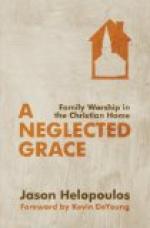Now the law of competence does not demand, yea, it forbids, more than a sufficiency to meet these peculiar exigencies of the child. Those parents who seek for more, become parsimonious, unfaithful to the moral interests of their household, and indifferent to all legitimate objects of charity and benevolence. These are indeed but the necessary fruits of unfaithfulness to this law; for the course of God’s providence indicates the impossibility of our faithfulness to the duty of Christian beneficence, and at the same time lay up for our children more than a sufficiency. We find indeed, that in almost every instance in which parents have transcended the limits of competence, and thus raised their children above the necessity of doing anything themselves for a subsistence, God has cursed the act, and the canker of His displeasure has consumed this ill-saved property. That curse we see often in the prodigality and dissipation of the children. They walk in the slippery paths of sin, kneel at the altar of Mammon, fare sumptuously every day, as prodigal in spending their fortune as their parents were penurious in amassing it, until at last they come to want, rush into crime, and end their unhappy life in the state’s prison, or upon the gibbet.
We see, therefore, that when parents give their children more than what they actually need, they place in their possession the instruments with which, they ruin themselves. History shows that the most wealthy men started out in the world with barely enough, and some, with, nothing; and that generally those who started with an independent fortune ended with less than they started, and many closed their earthly career in abject poverty and misery. Besides, the man who made his fortune knows how to keep and expend it; and in point of happiness derived from property, “there is no comparison between a fortune which, a man acquires by well applied industry, or by a series of success in his business, and one found in his possession or received from another.” Let, therefore, the property you leave your children be just enough to meet the exigencies of their situations, and no more; for
“Wealth hath never given happiness,
but often hastened misery;
Enough hath never caused misery, but often
quickened happiness;
Enough is less than thy thought, O pampered
creature of society,
And he that hath more than enough, is
a thief of the rights of
his brother!”
Parents should be impartial in the distribution of their patrimony among their children. They should never give one more than another unless for very plausible and Christian reasons, such as bad health, peculiar circumstances, of want, &c. They should have no pets, no favorites among them; and care more for one than for another, or indulge one more than another. Neither should they withhold a dowry, from a child as a punishment, unless his crime and character are of such an execrable nature as to warrant the assurance




